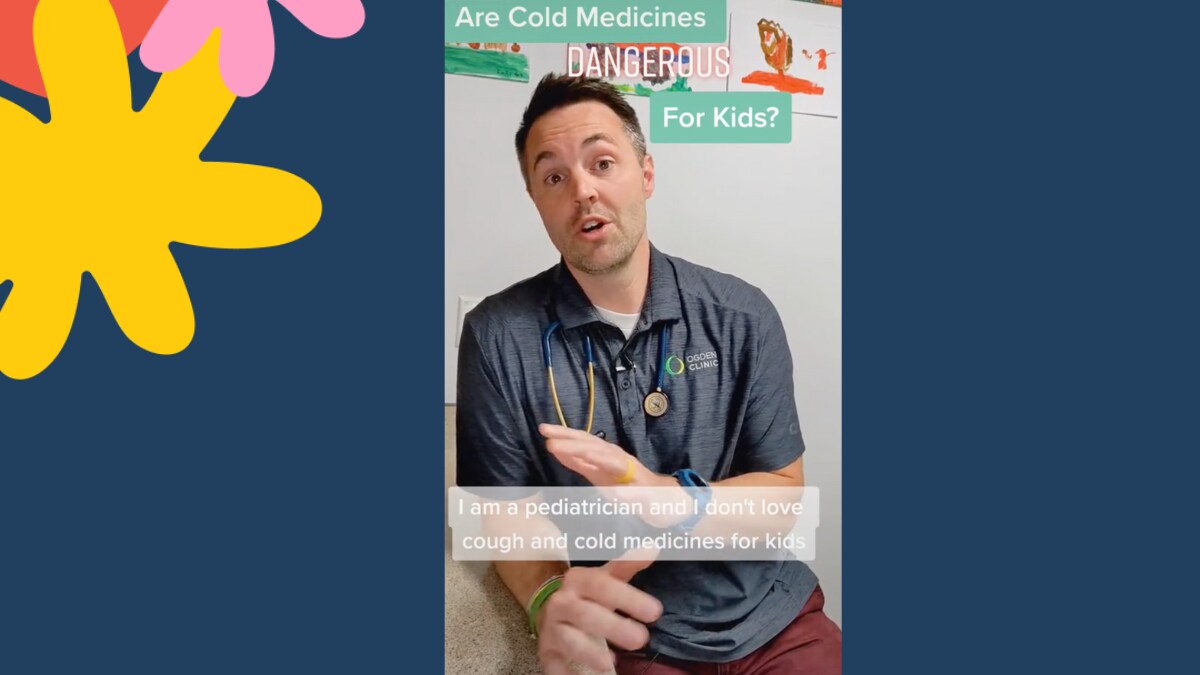When a kid is sick, parents and caregivers would do almost anything to help them feel better. Often, this includes heading to the pharmacy to purchase something over-the-counter to help them deal with their uncomfortable symptoms. But as we head into cold and flu season, some doctors are speaking out against using these kinds of store-bought medications, not only because of surprising risks for kids, but also because, well, they just don’t work very well.
Why are pediatricians speaking out against cough medicine?
In a recent viral post on TikTok, Dr. Jonathan Williams, a Utah pediatrician who goes by the username @TikTokKidDoc, shared why he actually advises against using over-the-counter cough and cold medicines for children.
“The truth of the matter is that cough and cold medicines have all kinds of risks and dangers associated with them that I think are way worse than just having a kid with a cold,” Williams says. “They can cause anything from heart palpitations to funny heart rhythms, nervousness, convulsions, respiratory stress and even death.”
Williams isn’t the only pediatrician speaking out on this issue. Dr. Tahrin Siddiqua, a pediatrician in Houston, Texas, also advises parents to “save your money” if you’re thinking about buying over-the-counter medicines for coughs and colds.
“We have a cough reflex for a reason,” she says. She also lists additional potential side effects, like jitters, vomiting and slowed breathing, and warns about accidental overdose.
Are cough medicines really bad for kids?
For a generation of parents who grew up being slathered in menthol rub and drinking cupfuls of grape-flavored cough syrup every time they got a cold, it may come as a shock that these over-the-counter medicines aren’t great for kids. The problem, says Dr. Jessica Kiss, a family medicine physician in Rolling Hills Estates, California, is that over-the-counter cough medicines for kids just haven’t been proven to be beneficial.
“There are several things to be aware of when we discuss cough medication for kids,” explains Kiss. “The first one is that the active ingredient in many of them is a decongestant or antihistamine, like the active ingredient in Benadryl. This can actually decrease the breathing rate in children. In very young kids, it can be the cause of rapid heart rate or even death.”
The other big issue is that many cough and cold medicines combine several active ingredients, like acetaminophen plus an antihistamine, that promise to diminish a variety of symptoms. Ultimately, Kiss adds, this can make them both risky and ineffective.
“They don’t contain enough of any active ingredient to really be helpful because of concerns that a parent might give another dose of one of the ingredients separately, risking overdose,” Kiss says. “So, they often just don’t work very well and they expose your child to unnecessary medicines.”
The best cough and cold treatments for kids
If cold symptoms are making your child completely miserable, you do have a few non-medicated options. In his video, Dr. Williams suggests using honey to treat coughs in kids over 1 year old.
“Under the age of 1, you do not want to try honey because of the risk of botulism,” stresses Kiss. “But, the reason honey works [for older children] is because it has antiseptic properties and can actually help improve illness. It also coats the throat to decrease the cough reflex.”
Kiss also recommends using steam and humidity to help with congestion.
“When I was a child, my mom used to put me in the bathroom and turn the shower on to make the whole room steamy,” she says. “She would stand me in the room for a bit. This still works very effectively. The trick is for it to be warm not hot steam, meaning that you don’t want your child’s face directly in the path.”
Most importantly, if your child has a persistent cough, Kiss says they need to be seen by their doctor.
“Remember, a cough is a symptom of another problem,” she says. “This can range from something simple, like a runny nose from allergies causing a reflex cough, to something much more serious, like pneumonia. Often, these things need to be treated very differently, so it’s best to talk to a medical professional prior to treating.”






